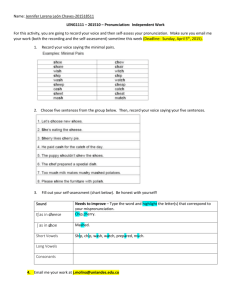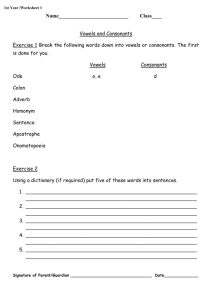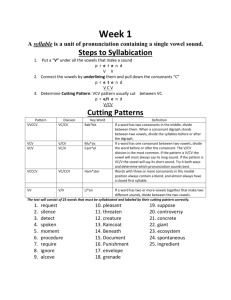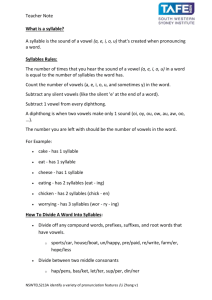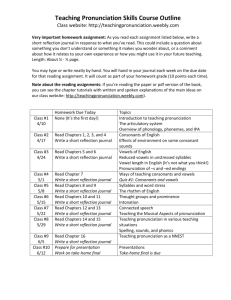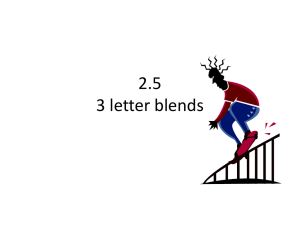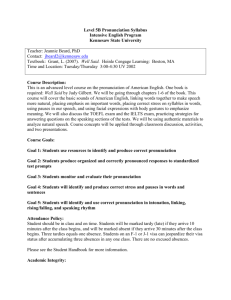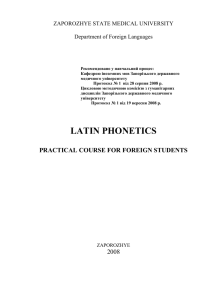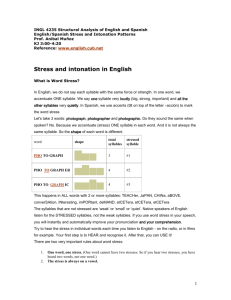Using a dictionary to improve your pronunciation
advertisement
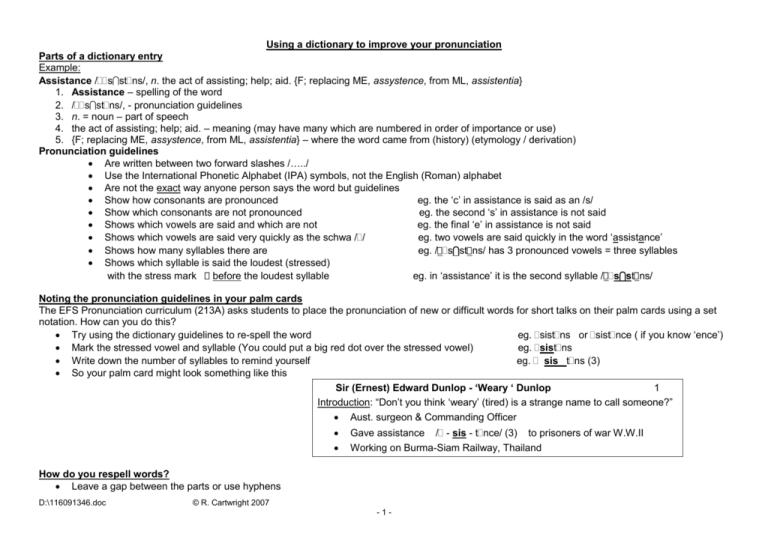
Using a dictionary to improve your pronunciation
Parts of a dictionary entry
Example:
Assistance /sstns/, n. the act of assisting; help; aid. {F; replacing ME, assystence, from ML, assistentia}
1. Assistance – spelling of the word
2. /sstns/, - pronunciation guidelines
3. n. = noun – part of speech
4. the act of assisting; help; aid. – meaning (may have many which are numbered in order of importance or use)
5. {F; replacing ME, assystence, from ML, assistentia} – where the word came from (history) (etymology / derivation)
Pronunciation guidelines
Are written between two forward slashes /…../
Use the International Phonetic Alphabet (IPA) symbols, not the English (Roman) alphabet
Are not the exact way anyone person says the word but guidelines
Show how consonants are pronounced
eg. the ‘c’ in assistance is said as an /s/
Show which consonants are not pronounced
eg. the second ‘s’ in assistance is not said
Shows which vowels are said and which are not
eg. the final ‘e’ in assistance is not said
Shows which vowels are said very quickly as the schwa //
eg. two vowels are said quickly in the word ‘assistance’
Shows how many syllables there are
eg. /sstns/ has 3 pronounced vowels = three syllables
Shows which syllable is said the loudest (stressed)
with the stress mark before the loudest syllable
eg. in ‘assistance’ it is the second syllable /sstns/
Noting the pronunciation guidelines in your palm cards
The EFS Pronunciation curriculum (213A) asks students to place the pronunciation of new or difficult words for short talks on their palm cards using a set
notation. How can you do this?
Try using the dictionary guidelines to re-spell the word
eg. sistns or sistnce ( if you know ‘ence’)
Mark the stressed vowel and syllable (You could put a big red dot over the stressed vowel)
eg. sistns
Write down the number of syllables to remind yourself
eg. sis tns (3)
So your palm card might look something like this
Sir (Ernest) Edward Dunlop - ‘Weary ‘ Dunlop
1
Introduction: “Don’t you think ‘weary’ (tired) is a strange name to call someone?”
Aust. surgeon & Commanding Officer
Gave assistance / - sis - tnce/ (3) to prisoners of war W.W.II
Working on Burma-Siam Railway, Thailand
How do you respell words?
Leave a gap between the parts or use hyphens
D:\116091346.doc
© R. Cartwright 2007
-1-
‘marsupial’ /ma sjupil/ (pronunciation guidelines) /mar - soup - e - l/ (respelling)
Use words or spelling you know
Activity
1. Look up the following words in the dictionary and complete the table
2. Then add at least three new or difficult words you might use in your presentation on a person famous in Australian Society
Word
Pronunciation
guidelines
/………../
How
many
vowels
are
there in
the spelt
word?
How
many
vowels
are
said?
How
many
syllables
are
there?
Which
vowels are
said as
schwa //?
Which syllable
is stressed?
(Said louder)
Are any
consonants
not
pronounced?
Write them in
here.
Are any
consonants
said
differently?
Write them in
here.
Re-spell the word
and mark in the
stressed syllable.
equestrian
/ kwstrin/
5
4
4
first and last
second
nil
qu = kw
/ - ques - tree - n
parliamentarian
academic
nocturnal
monotreme
genetic
knowledgeable
For your next talk
Follow this procedure for any new or difficult words
Add the pronunciation guidelines or respelling to your palm cards
Practise the words in sentences, not just on their own
Have a good speaker of English check your pronunciation or record yourself and listen to yourself
D:\116091346.doc
© R. Cartwright 2007
-2-
